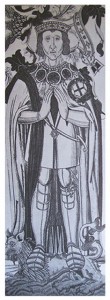 Chronicler and Windsor Herald Charles Wriothesley recorded that on this day in 1536 Thomas Boleyn, Earl of Wiltshire and father of the late Queen Anne Boleyn, was stripped of his office of Lord Privy Seal:
Chronicler and Windsor Herald Charles Wriothesley recorded that on this day in 1536 Thomas Boleyn, Earl of Wiltshire and father of the late Queen Anne Boleyn, was stripped of his office of Lord Privy Seal:
“Item, this yeare, in Trinitie terme, the Soundaie after Corpus Christi daie, the Erie of Wilshire, Sir Thomas Bolleine, father to Queene Anne, delivered the Kinges Privie Scale, wherof he was Custos, into the Kinges handes; and after Sainct Peeters daie, at Midsommer, Mr. Thomas Crumwell, Secretarie to the Kinges Grace and Master of the Rolls, had the Privie Scale delivered to him.”1
As Wriothesley records, Thomas Cromwell took the position and we know that he was formally appointed on 2nd July 1536. One man fell and another rose.
Notes and Sources
- Wriothesley, Charles. A chronicle of England during the reigns of the Tudors, from A.D. 1485 to 1559, p49